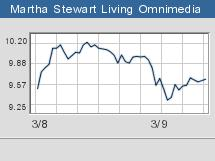NEW YORK (CNN/Money) -
While Martha Stewart is expected to resign from the board of the company she founded after her conviction for lying about a stock sale, she is also expected to keep a creative role with the firm, CNNfn has learned.
An announcement may come later Friday or early next week, although an agreement on her new role has not been finalized and may still break down, a person with knowledge of the situation said.
| 
| |

| 
| 
|

|
 Martha Stewart will leave the board of directors of the company she founded following her conviction. CNNfn's Allan Chernoff reports. Martha Stewart will leave the board of directors of the company she founded following her conviction. CNNfn's Allan Chernoff reports.
|
 Play video
Play video
(Real or Windows Media)
|
| 
|

|
|
A spokeswoman for Martha Stewart Living Omnimedia (MSO: Research, Estimates) declined to comment.
Stewart's departure from the board of the company isn't a huge surprise.
"There's no issue she's going to leave the board," a person close to the situation told CNNfn Monday. "It would be inappropriate to be a board member. She would like to stay involved with the creative side of the business."
The company's board met Monday at the offices of law firm Fried Frank for several hours, but concluded its discussions without making any public statement.
The board's deliberations came after Stewart was convicted last Friday on four counts of lying and obstructing justice regarding her well-time sale of ImClone Systems stock in late 2001.
Directors at Martha Stewart Living may be trying to determine how much damage the Martha Stewart brand has suffered from the conviction.
Sentencing of the 62-year-old Stewart could also complicate matters.
A majority of those surveyed this week said the home decor expert should go to jail. Forty percent said she should not.
When asked if Stewart was treated fairly, 66 percent of those polled said she was, while 27 percent said no.
The survey also found women more sympathetic to Stewart, with 57 percent of men surveyed saying she should go to jail, and nearly half of the women saying she should not.
Martha, board plot strategy
While the company maps a contingency plan, industry watchers said the Martha Stewart brand might not survive, especially if she goes to jail.
"The brand as we know it is dead. Any brand that's built exclusively around a single personality can't survive something like this," said Howard Davidowitz, a veteran retail consultant.

"We're likely to see advertisers pull away" from her magazines and TV shows, Davidowitz said. "They would much rather invest in Oprah's media publishing empire rather than associate with the Stewart brand now."
Robert Passikoff, a New York-based brand consultant who has been tracking the Martha brand for nearly three years, agreed.
"This company, as it is configured today, is unsuited to compete in the marketplace with its brand taken away," said Passikoff. "Will the company survive? That remains to be seen. The immediate thing for MSO to do is distance the company from Stewart."
That process was already under way, analysts said, as the company's revenue, advertisers, readers -- and its stock price -- were all eroding because of Stewart's indictment and conviction.
The stock had lost about half its value after Stewart was implicated in the ImClone scandal, though it later recovered some of that ground.
Over the past year, the company launched a new magazine -- Everyday Food -- that doesn't feature Stewart's name prominently on the cover, and a new TV show called "Pet Keeping with Marc Morrone" that excludes Martha entirely.
"We are confident that our assets -- our senior management team, our talented employees, our quality brand labels, our Omni business model and infrastructure, and our financial strength reflecting $169 million cash in the bank and no debt -- are more than sufficient to continue MSO's development as a leading 'how to' brand building company," the company said in a statement following Friday's verdict.
New York-based Martha Stewart Living, which runs publishing, television and merchandising divisions, recently reported profits that topped Wall Street forecasts for the latest quarter.
But it also warned that its founder's trial was hurting ad revenue, and recorded its first annual loss since going public in 1998.

-- CNNfn's Allan Chernoff and CNN/Money's Parija Bhatnagar contributed to the story
|


